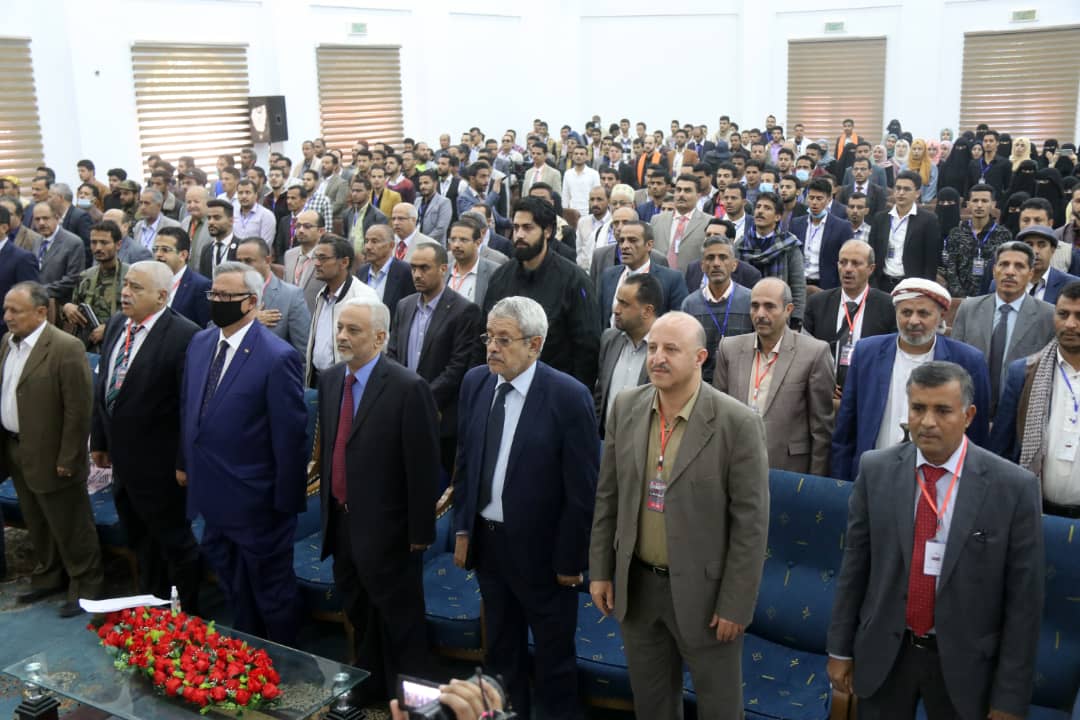The Prime Minister, Dr. Abdel-Aziz bin Habtour, stressed that universities and research institutions shoulder responsibility for studying the various problems of society and identifying scientific treatments for them, including the harms of Qat.
While opening the three-day conference organized by the Faculty of Medicine at Sana’a University, with the participation of more than 1,000 doctors, medical staff, researchers and other interested persons, His excellency the Prime Minister stressed the fact that such issues as the harms of Qat can only be dealt with through serious scientific discussions and deliberations at the universities and colleges in order to come up with scientific outcomes and solutions to address them. He pointed out that the vast majority of Yemenis, including the educated ones, deal with the issue of chewing Qat in a normal way despite their awareness of the harm it causes to their health and other aspects of daily life.
He stated that the anti-Qat associations in the Capital Secretariat (Sana’a) and the governorates have not played an active role in combating Qat. He also pointed out that the battle against Qat among Yemenis is difficult and complex, because it is a battle of awareness. Most Yemenis regard chewing Qat as a way of solving problems at a time when it is a problem in itself.
He said, “I think that holding the conference today is the first step in dealing responsibly with one of the problems of society whose members like the university professors can only deal with them and address all the challenges that hinder development and progress at the social level”.
He also said, “It is important that Ulama (religious leaders) participate in this conference, because they have a great responsibility towards their homeland and society, which holds them in high esteem”.
He considered the conference and its theme important and vital, requiring the recognition of its results with the participation of Ulama to bring it to society and achieve the desired awareness and effect. He, then, thanked the Rector of Sana’a University and the Dean of the Faculty of Medicine for organizing such a scientific event, urging other universities to conduct conferences to discuss this kind of issues related to community and to raise awareness of community members.
The Minister of Agriculture, Engineer Abdulmalik Al-Thawr, the Minister of Electricity, Mr. Ahmed Al-Ali and the Minister of Higher Education and Scientific Research, Mr. Hussein Hazeb attended the conference. Mr. Hazeb praised the role of Sana’a University and its effort to raise awareness towards combating the harms of Qat through conducting the first conference in this regard in 2022. He called on Yemeni universities to focus on the community-based issues and problems like the cultivation and chewing of Qat and its impact on health, economic and social aspects. He also highlighted the fact that there should be suitable alternatives and remedies for Qat farmers and sellers, stressing the need for making available special places for cultural and sports activities in order to help and motivate young people to quit chewing Qat. He finally stressed that the recommendations and outcomes of the conference will be taken into due consideration by the Ministry of Higher Education and Scientific Research, and by the Supreme Political Council.
Dr. Najib Al-Qubati, deputy minister of the Ministry of Health, reviewed the psychological effects of Qat and its relationship to the disease spread of oncology, digestive and cardiovascular systems, mouth and gum due to over-consumption. He pointed out that the use of pesticides and chemical materials increases negative effects of Qat on fetuses, pregnant women, liver virus, congenital malformations and premature births, according to the findings of studies and research conducted on a number of cases. He also pointed out the Ministry of Health had launched an awareness-raising and educational campaign to address the harms and risks of Qat. It would be circulated to the health facilities in districts and governorates.
The Rector of Sana’a University, Prof. Al-Qassem Mohammed Abass, confirmed that the university had boldly decided to announce the birth of a new Yemen that is agricultural self-sufficiency and free from the malignant Qat tree. He stated that Sana’a University launched this year with such a scientific conference with a view of revealing the effects and risks caused by Qat tree on the individuals’ health, society, agriculture and the economic position of Yemen, and helping decision makers make the right decisions accordingly. Such a conference was based on scientific methodologies and knowledge.
Prof. Al-Qassem pointed out that quitting the Qat chewing requires extensive awareness of the dangers and damages of this plant, which hinders the progress and building of the country and the preparation of generations capable of building and development. He stressed the importance of the role of the media, Ulama, religious guides and teachers in raising awareness of the Qat dangers, communicating the findings and researches of this conference to the public.
The Chairman of the Conference Preparatory Committee, Dean of the Faculty of Medicine, Dr. Hassan Al-Mahbashi, reviewed the objectives of the conference in which fifty (50) scientific research and papers on “the Impact of Chewing Qat on the cardiovascular system, digestive system, liver, nervous and psychological system, pregnant women, kidney, reproductive system, surgeries, secretion of hormones in the body, gum, teeth, and diabetes” will be delivered. In the first day sessions of the conference, research and papers on “chewing Qat leads to the disruption of heartbeat and heart diseases; the impact of chewing Qat on heart function; chewing Qat among Yemeni women; the impact of Qat on common surgical conditions.”
The deputy minister of Higher Education and Scientific Research, Dr. Ali Sharafuddin, undersecretaries of the Ministry of Higher Education and Scientific Research, a number of stakeholders, Rectors of public and private universities, hospitals directors, and deans of colleges attended the opening ceremony of the conference.

